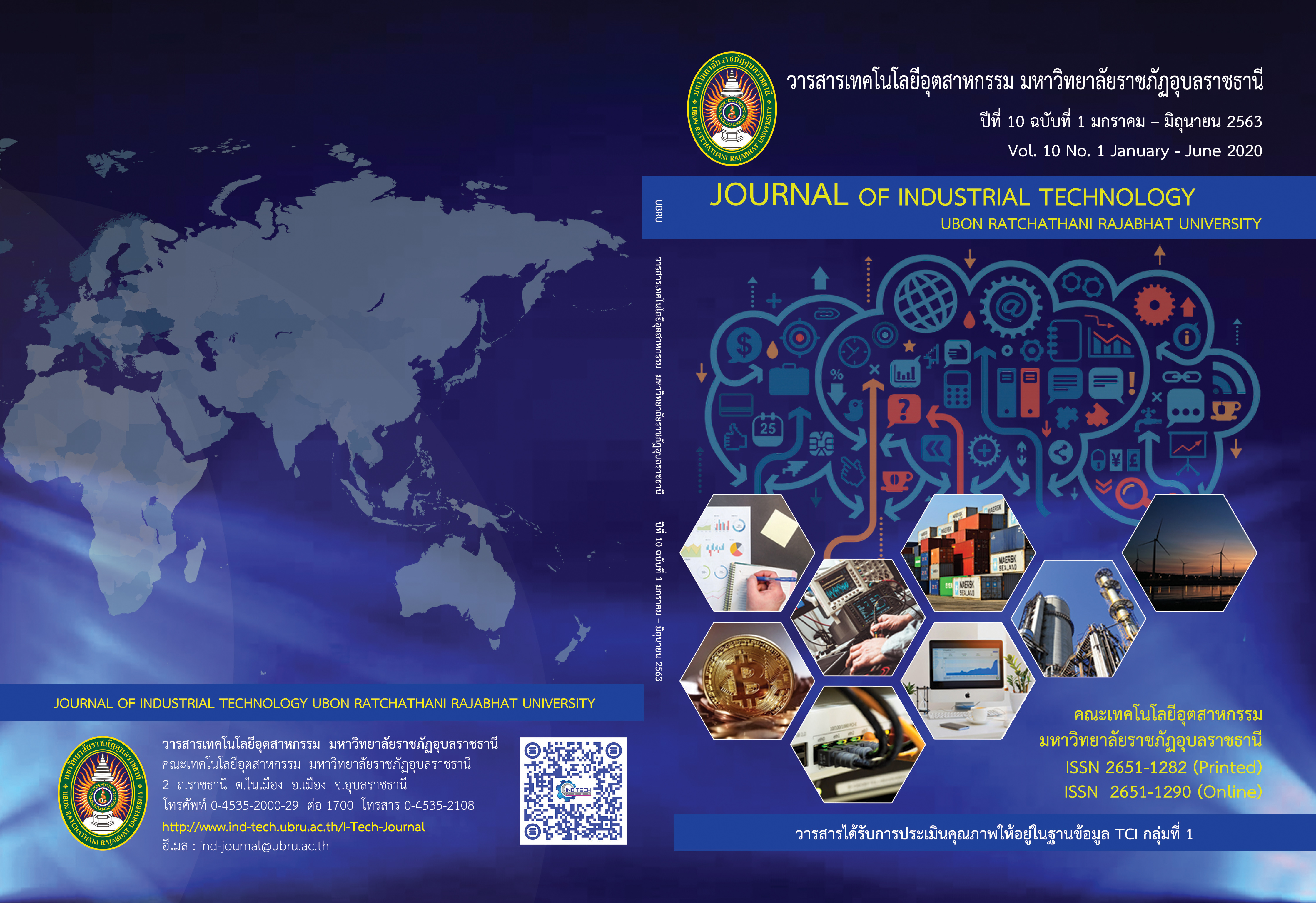การวางแผนการขนส่งสินค้าด้วยตัวแบบกำหนดการเชิงคณิตศาสตร์: กรณีศึกษาการขนส่งขาเข้า
Main Article Content
บทคัดย่อ
งานวิจัยนี้มีวัตถุประสงค์ เพื่อแก้ปัญหาการวางแผนการขนส่งสินค้าขาเข้าแบบหลายขั้นตอน ได้แก่ ขั้นตอนการมอบหมายรถบรรทุกให้กับศูนย์กระจายสินค้า ขั้นตอนการมอบหมายศูนย์กระจายสินค้าให้กับแหล่งวัตถุดิบหรือแหล่งผลิต และขั้นตอนมอบหมายสินค้าให้กับศูนย์กระจายสินค้า ด้วยการสร้างตัวแบบกำหนดการเชิงเส้นผสม (MILP) จากการศึกษาข้อมูลเบื้องต้น พบว่าเงื่อนไขและปัญหาของบริษัทกรณีศึกษาสามารถใช้เป็นตัวแทนของปัญหารูปแบบเดียวกันได้ พิจารณาจากการขนส่งสินค้าแบบหลายปัจจัย เช่น รถบรรทุกหลายขนาด หลายแหล่งผลิต และหลายศูนย์กระจายสินค้า เป็นต้น การเขียนชุดคำสั่งบนโปรแกรม LINGO 11.0 และประเมินด้วยชุดตัวอย่างความต้องการจริงจำนวน 3 ชุดปัญหา ผลลัพธ์ที่ได้มีความถูกต้องและน่าเชื่อถือ บริษัทกรณีศึกษาสามารถลดต้นทุนค่าขนส่งสินค้าได้ร้อยละ 21.21 หรือคิดเป็นมูลค่าประมาณ 15,320,664 บาทต่อปี
Article Details
บทความที่ได้รับการตีพิมพ์ในวารสารฯ ท้ังในรูปแบบของรูปเล่มและอิเล็กทรอนิกส์เป็นลิขสิทธิ์ของวารสารฯ
เอกสารอ้างอิง
Office of the Permanent Secretary. Final Energy Consumption Classified by Transport Characteristics [Internet]. 2019 [cited 2019 January 2] available form: http://statv2.nic.go.th/
logistic/15011000_07.php (in Thai)
Energy Policy and Planning Office Ministry of Energy. Carbon dioxide (CO2) emissions from energy consumption [Internet]. 2019 [cited 2019 January 4] available form: http://www.eppo.
go.th/index.php/en/ (in Thai)
Supattananon N and Akararungruangkul R. The Optimal Transportation Cost for Truck Routing and Truck Selection with Various Size by Mixed Integer Programming Model: A Case Study of Beverage Distribution Firm. IE Network Conference; 2016 July 7-8; Kosa Hotel. Khonkean: Department of Engineering in Khonkean University; 2016: 38-45. (in Thai)
Chana FTS, Jhab A and Tiwaric MK. Bi-Objective Optimization of Three Echelon Supply Chain Involving Truck Selection and Loading using NSGA-II with Heuristics Algorithm. Applied Soft Computing. 2016; 38: 978-987.
Felix TSC, Aditya J and Manoj KT. Bi-Objective Optimization of Three Echelon Supply Chain Involving Truck Selection and Loading using NSGA-II with Heuristics Algorithm. Applied Soft Computing. 2016; 38: 978-987.
Vahdani B, Niaki STA and Aslanzade S. Production-Inventory-Routing Coordination with Capacity and Time Window Constraints for Perishable Products: Heuristic and metaheuristic algorithms. Journal of Cleaner Production. 2017; 161: 598-618.
Lee JE, Chung KY, Lee KD and Gen M. A Multi-Objective Hybrid Genetic Algorithm to Minimize the Total Cost and Delivery Tardiness in a Reverse Logistics. Multimed Tools Appl. 2015; 74: 9067–9085.
Sherif AM and Scott JM. Integrated Cost Optimization in a Two-Stage, Automotive Supply Chain. Computers and Operations Research. 2016; 67: 1-11.
Boonmee C and Kasemset C. The Application of Distribution Network Optimization: A Case Study of the Canned Fruit Industry. Journal of Operations Research. 2014; 2(2): 1-10. (in Thai)
Bahrampour P, Safari M and Taraghdari MB. Modeling Multi-Product Multi-Stage Supply Chain Network Design. Procedia Economics and Finance. 2016; 36: 70-80.
Maximiliano RB, Jorge MM and Gabriela C. An Exact Mathematical Formulation for the Optimal Log Transportation. Forest Policy and Economics. 2018; 95: 115-122.
Duan LS and Ventura JA. A Dynamic Supplier Selection and Inventory Management Model for a Serial Supply Chain with a Novel Supplier Price Break Scheme and Flexible Time Periods. European Journal of Operational Research. 2019; 272(3): 979-998.
Juan JT and Rodrigo AG. Forestry Production and Logistics Planning: An Analysis using Mixed-Integer Programming. Forest Policy and Economics. 2005; 7(4): 625-633.
Faminow MD and Sarhan ME. The Location of Fed Cattle Slaughtering and Processing in the United States: An Application of Mixed Integer Programming. Canadian Journal of Agriculture Economics. 1983; 31: 425-436.
Lambert DM and Cooper MC. Supply Chain Management: Implementation Issues and Research Opportunities. The International Journal of Logistics Management. 1998; 9(2): 1-19.
khalifehzadeh S and Fakhrzad MB. A Modified Firefly Algorithm for Optimizing a Multi Stage Supply Chain Network with Stochastic Demand and Fuzzy Production Capacity. Computers & Industrial Engineering. 2019; 133: 42-56.


